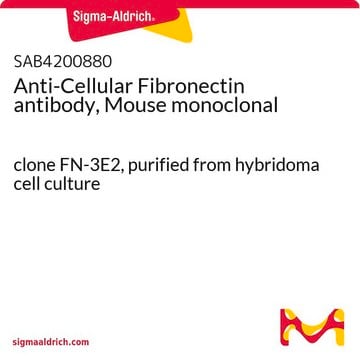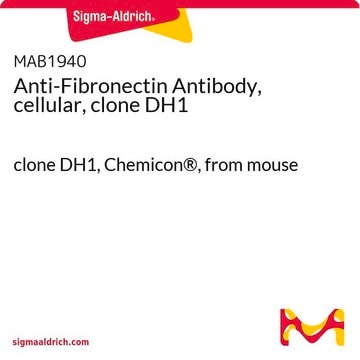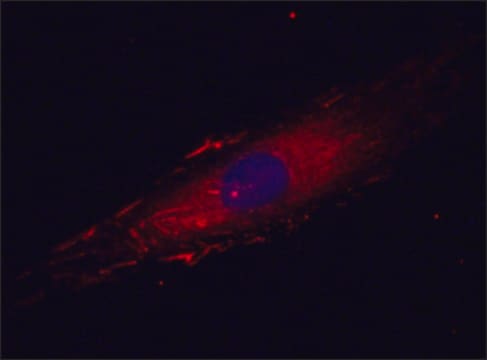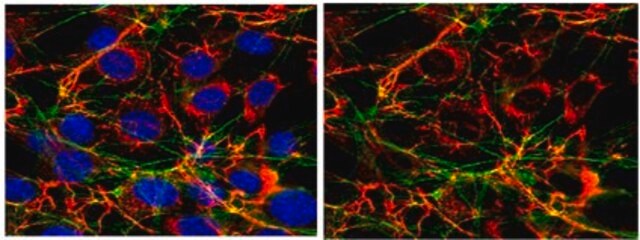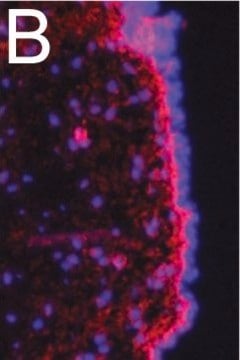추천 제품
생물학적 소스
mouse
Quality Level
항체 형태
culture supernatant
항체 생산 유형
primary antibodies
클론
FN-3E2, monoclonal
형태
buffered aqueous solution
분자량
~220-260 kDa
종 반응성
chicken, rat, human, mouse
기술
immunoblotting: suitable
immunofluorescence: 1:2,000-1:4,000 using human foreskin fibroblast Hs68 cells
immunohistochemistry: suitable
동형
IgM
UniProt 수납 번호
배송 상태
dry ice
저장 온도
−20°C
타겟 번역 후 변형
unmodified
유전자 정보
human ... FN1(2335)
일반 설명
Anti-Cellular Fibronectin antibody, Mouse monoclonal (mouse IgM isotype) is derived from the FN-3E2 hybridoma produced by the fusion of mouse myeloma cells and splenocytes from mice immunized with the antigens released in culture from a breast cancer cell line. Fibronectin (FN), also known as cold-insoluble globulin (CIG), is an extracellular matrix multi-domain glycoprotein composed of two nearly identical disulphide bound polypeptides. Fibronectin 1 is a glycoprotein, that is coded by FN1 gene. It is expressed in the plasma and at the cell surface. It is mapped to human chromosome 2q35. Cellular fibronectin is produced by various cell types, including fibroblasts, endothelial cells, chondrocytes, synovial cells, and myocytes.
면역원
Antigens released in culture from a breast cancer cell line
애플리케이션
Anti-Cellular Fibronectin antibody, Mouse monoclonal has been used in:
- immunoblotting
- immunofluorescence
- immunohistochemistry
Anti-cellular Fibronectin antibody, mouse monocloneal has been used in various immunochemical techniques including immunoblotting (220-260 kDa), immunofluorescence, and immunohistochemistry.
생화학적/생리학적 작용
Fibronectin participates in cell adhesion, growth, migration, wound healing, blood coagulation and metastasis. Mutations in FN1 results in glomerulopathy. It plays an important role in cell attachment and spreading, control of cell cytoskeleton, morphology and differentiation. FN1 is also involved in extracellular matrix formation, haemostasis and thrombosis. It is a ubiquitous and essential component of the extracellular matrix (ECM) and plays a vital role in tissue repair mechanism.
물리적 형태
The product is supplied as a culture supernatant solution containing 15 mM sodium azide as a preservative. The product contains fetal calf serum.
기타 정보
This product is for R&D use only, not for drug, household, or other uses.
Not finding the right product?
Try our 제품 선택기 도구.
Storage Class Code
10 - Combustible liquids
WGK
WGK 3
Flash Point (°F)
Not applicable
Flash Point (°C)
Not applicable
시험 성적서(COA)
제품의 로트/배치 번호를 입력하여 시험 성적서(COA)을 검색하십시오. 로트 및 배치 번호는 제품 라벨에 있는 ‘로트’ 또는 ‘배치’라는 용어 뒤에서 찾을 수 있습니다.
Paulina Escandon et al.
International journal of molecular sciences, 23(8) (2022-04-24)
Salivary exosomes have demonstrated vast therapeutic and diagnostic potential in numerous diseases. This study pioneers previously unexplored roles of SE in the context of corneal wound healing by utilizing primary corneal stromal cells from healthy (HCFs), type I diabetes mellitus
Receptors for cold-insoluble globulin (plasma fibronectin) on human monocytes.
Bevilacqua MP, et al.
The Journal of Experimental Medicine, 153(1), 42-60 (1981)
The extracellular matrix proteins laminin and fibronectin contain binding domains for human plasminogen and tissue plasminogen activator.
Moser TL, et al.
The Journal of Biological Chemistry, 268(25), 18917-18923 (1993)
Plasma and cellular fibronectin: distinct and independent functions during tissue repair
To WS, et al.
Fibrogenesis & Tissue Repair, 4(1), 21-21 (2011)
Somshuvra Bhattacharya et al.
Frontiers in bioengineering and biotechnology, 8, 1040-1040 (2020-10-06)
Oxygen deprivation within tumors is one of the most prevalent causes of resilient cancer cell survival and increased immune evasion in breast cancer (BCa). Current in vitro models do not adequately mimic physiological oxygen levels relevant to breast tissue and
자사의 과학자팀은 생명 과학, 재료 과학, 화학 합성, 크로마토그래피, 분석 및 기타 많은 영역을 포함한 모든 과학 분야에 경험이 있습니다..
고객지원팀으로 연락바랍니다.


